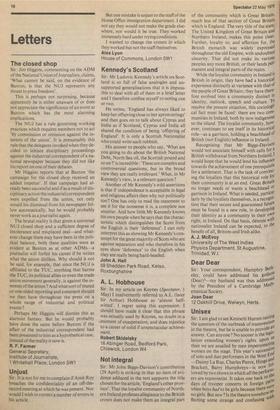The closed shop
Sir: Jim Higgins, commenting on the ADM of the National Union ofJournalists, claims, 'What cannot be said, on the evidence of Buxton, is that the NUJ represents any threat to press freedom'.
This is perhaps not surprising, because apparently he is either unaware of or does not appreciate the significance of an event at Buxton which has the most alarming implications.
The NUJ has a rule governing working practices which requires members not to act 'by commission or omission against the interests of the union'. It is presumably this rule that the delegates invoked when they decided to initiate disciplinary proceedings against the industrial correspondent of a national newspaper because they did not like his report on one of their debates.
Mr Higgins reports that at Buxton 'the campaign for the closed shop received an added impetus'. If that campaign had already been successful and if as a result of disciplinary action the industrial correspondent were expelled from the union, not only would his dismissal from his newspaper follow automatically, but he would probably never work as a journalist again. • The brutal reality is that given a universal NUJ closed shop and a sufficient degree of intolerance and misplaced zeal—and whatever change there may have been in the political balance, both these qualities were as evident at Buxton as at other ADMs—a journalist will forfeit his career if he writes what the union dislikes. Why should it not be said, for example, that since the NUJ is affiliated to the TUC, anything that harms the TUC, its political allies or even the trade union movement generally, is against the interests of the union ? And what sort of muted or one-sided reporting and comment should we then have throughout the press on a whole range of industrial and political events?
Perhaps Mr Higgins will dismiss this as alarmist fantasy. But he would probably have done the same before Buxton if the affair of the industrial correspondent had been presented to him as a hypothetical case, instead of the reality it now is.
R. F. Farmer General Secretary, Institute of Journalists, 1 Whitehall Place, London SW1


































 Previous page
Previous page